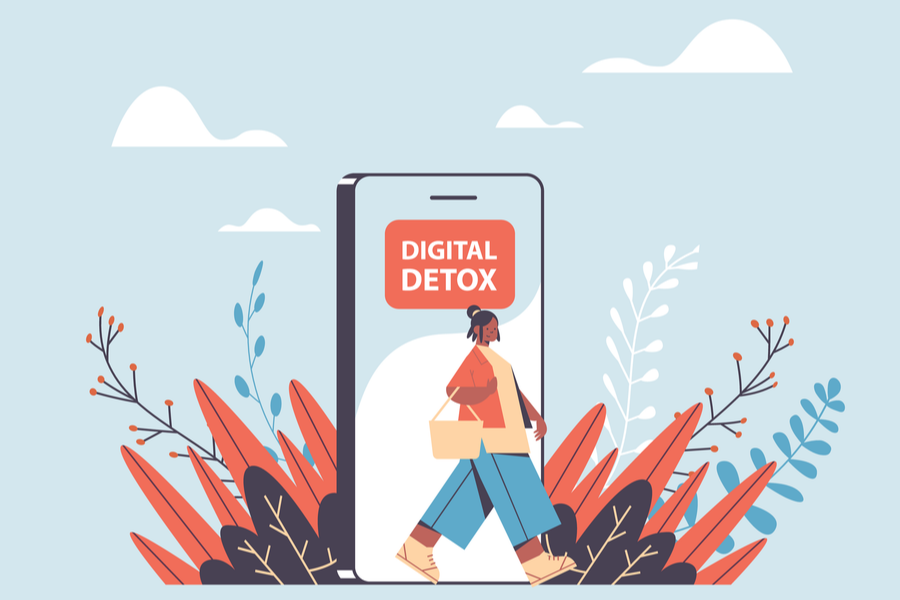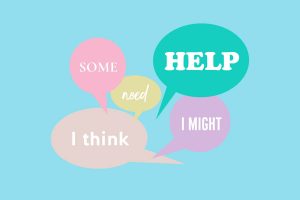How to do a digital detox this weekend

‘Zoom fatigue’ is no joke. There’s research to prove it. To be clear, ‘zoom fatigue’ can happen when using any video-call platform such as FaceTime or WhatsApp.
Part of us wants to chuck our phone and computer out the window – but of course, we won’t – and part of us never wants to do a video call again. So, it’s no surprise that we’re starting to find some time away from the screen.
The goal of a digital reset isn’t merely about cutting down on screen time. It might also be a time to give yourself a mental cleanse – building a routine that works better for you, carving out moments of mindfulness, or simply using the downtime for relaxing pleasures like a cosy blanket or a hot bath.
Venetia La Manna, podcaster, broadcaster, and creator of ‘offline 48’ explains how she has created boundaries with her phone to keep her ‘mental health in check’.
“I absolutely want to be connected with my friends and family as they massively lift my spirits. However, due to the uncertainty, heightened emotions, and never-ending news updates, I’ve had to alter my boundaries with social media: going offline for extended periods, turning off notifications and deleting news apps,” she says.
Covid and the lockdown can’t be totally to blame though, there was already significant research to show that social media and increased screen time could be detrimental to our mental wellbeing affecting important factors such as stress and anxiety. Research also suggests that there is a strong link between screen time and sleep quality.
Holly Huntley, Nutritional Therapist and Herbal Specialist at Pukka Herbs says: “The constant exposure to the digital world can have a negative effect on our health. For example, it’s well known that the blue light emitted from a screen can affect your ability to sleep.
“For many of us, a good night’s sleep is the difference between a good day and a bad day for most of us. During healthy sleep, the immune system releases proteins called cytokines which help to promote sleep,” Holly explains. “It also helps to reduce stress, support mental wellbeing and improve heart health. Just one more great reason to try and decrease your screen time. As the evening draws in, set all your devices to ‘night mode’ so the blue light doesn’t disrupt your circadian rhythm.”
The average person touches their phone a whopping 2,617 times per day, and 87% of us will check our phones between midnight and 5am. While email and social media have their place, this intrusion into our lives can affect real-life relationships as well as our mental health.
“My husband and I have been turning off our phones every weekend for the past couple of years,” explains Venetia. “We’ve altered our habits slightly so we can remain connected. We try to pre-arrange FaceTimes with our loved ones ahead of the weekend and then we turn our phones on intermittently to check-in to see if everyone is okay. But our social media apps remain OFF for the entire weekend.”
With the weekend just around the corner, now could be the perfect time to take time away from devices to give you the opportunity to be present with loved ones and give yourself a mental break.
Here are some tips to help you get started with a digital detox:
- Make a list of the apps or gadgets you want to use less
Start by making a list of all the devices and apps you use in a day – you might be surprised how much technology you use. It’s not practical to remove all technology from your life for an extended period, but you can set limits whereby you don’t pick up your phone for a reason.
Holly explains: “It is easier than ever to be connected 24/7 – in fact, most of the time we barely have to move our arm to touch our phones. Our brains are designed to seek out information and we get a little dopamine hit when we find the information we’re after which can be addicting. Start by removing some forms of technology from your routine this weekend, it can be really helpful for your mental wellbeing, even if it’s just for a short period of time.”
- Tell other people about your digital detox
If you’re usually available to everyone 24-hours a day, don’t suddenly disappear without a trace. Communicate to your family and friends that you’re taking time away from your phone and/or laptop for the weekend and let them know how and when they can contact you.
- Start with baby steps
If you’re always online – no judgement here – then we’re not suggesting you go cold turkey because you’ll find it incredibly difficult to suddenly put everything away and live a zen-like existence. Again, this goes back to setting boundaries.
Venetia suggests ‘switching off your phone for a few hours, or simply leaving it at home when you go out for your allocated exercise this weekend’. This is a great way to get some headspace and feel less reliant on your device.
- Plan alternatives for your digital detox
Being off your phone gives you the opportunity to be truly present, but if you’re used to watching lots of TV or spending time scrolling through Instagram then you might not know how to fill your time. Isolation has also meant we’re spending more time than ever sitting down so why not use your extra moments to do some exercise or yoga.
“Sitting down for too long can leave your body feeling achy. If you’ve been hunched over a laptop all week, then make sure to get moving,” Holly says. “Getting outside into nature has been proven to boost our emotional wellbeing and going for a walk can help take the strain off those tense muscles – double win.”
- Use something to encourage mindfulness
Often checking our phone, our social media or our emails is a habit we fall into all too easily; we find ourselves reaching for our devices without thinking about it. Mindfulness can help with this and there are plenty of natural remedies – such as Ashwagandha – to help us adapt with life’s daily stressors.
Venetia says, “When you’re detoxing, try to spend at least the first hour of your day without your phone. This is a great time to enjoy a little home yoga, meditation, journaling, and a delicious herbal tea.”








